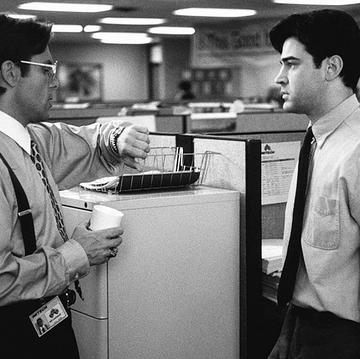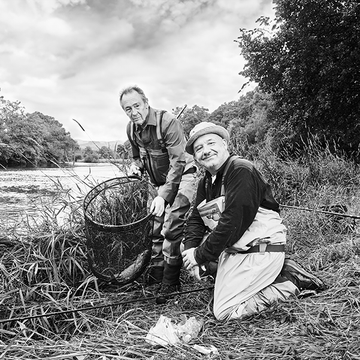Ken Baker was 16 when he started dating Jenny, a girl from his blue collar Buffalo suburb. It was a sweet love; just not an urgent, primal one. They'd make out, but stop before anything got too serious. Jenny was terrified of getting pregnant, which sounded logical to Ken, who'd grown up hearing his father say that getting a girl pregnant would "ruin your life."
Ken and Jenny were able to bump along in their relationship—in love, but definitely not in lust. Ken didn't want to admit it, but abstinence didn't feel like much of a sacrifice. Sex is the main currency of teenage boyhood, and all the boys in Buffalo were trading in it: Thinking about it, wanting it, and actually having it. In the locker room before hockey practice, though, all Ken's teammates wanted to hash over the details about their adolescent conquests. Ken, who had hit the other markers of puberty—voice deepening, baby fat melting away—like every other adolescent boy, began to feel a slow, growing dread. "Guys on my hockey team said they have dumped girls because they wouldn't go all the way," he writes in the newly re-released The Late Bloomer: A Memoir of My Body, which first debuted in 2001. "One fellow has even boasted that he kicked a girl out of his car because she wouldn't swallow… Everyone is having sex. And so should I."
In a preemptive move to ward off any potential mocking or bullying, he tried to out-testosterone his friends and teammates. He wore his baseball cap backwards and listened to hard-rock music. He made up sexual encounters to brag to his friends about—ones he cobbled together from stories he'd heard from his older brothers and from older guys in the locker room. He paged through issues of Penthouse and listened to the raunchy novelty act Dr. Dirty with his friends (albums include 1998's Beaver Fever and 1992's Butt Seriously Folks.)
Ken's 17th birthday was looming, and college too—and with both, the feeling that he needed to lose his virginity, fast.
Jenny agreed. She wanted to plan a romantic overnight trip for his 17th birthday in Toronto, a two-hour drive away, and far from parents. Ken was anxious in the months leading up to the trip, wondering if he'd be able to complete the act. In the hotel room, with Foreigner playing in the background and condoms at the ready, he was able to get a half erection—enough to have some version of sex with a disappointed but understanding girlfriend. "I keep my eyes closed and grip her swaying hips, waiting for it all to end," he writes.
This scene—or a variation thereof—would play out again and again during Ken's college years at Colgate, where he got a hockey scholarship. Women pursued him, but he fended them off; he had to concentrate on the sport, he told them. It would happen after college in Virginia, where he was working as a journalist. The women changed, but the sequence stayed the same: "The moist meeting of our lips...her repeatedly squeezing and pulling on my flaccid penis...the failure...yanking her hand away...her pleading, Is it me?...me telling her to just go home."
The sudden freeze on Ken's sex drive happened when he was 14. It was replaced by a feeling of emotional paralysis. "At 13, I remember seeing the girl next door sunbathing and thinking, Oh man, that's hot," Ken, now 46 and a senior correspondent on E! News, told Esquire in an exclusive interview. (On October 7, a film inspired by his memoir, starring Maria Bello and J.K. Simmons, will hit theaters.) But that excitement about girls didn't progress into a desire to be intimate. He writes, "The pressure to have sex is more of an external force (mostly fraternal and peer pressure) than an internal bubbling from my loins."
In his late teens, Ken was depressed and confused. He felt like he was missing out on something huge, but he didn't know how to fix it. He knew he wasn't gay, either, given his complete lack of interest in men, or asexual: "I was always attracted to women," says Ken. He finally gave up, chalking it up to a low sex drive.
Then, as he moved into his mid-20s, Ken began to develop a set of mysterious physical symptoms: crippling headaches, a loss of energy, and persistent fatigue. His nipples were sore and swollen; one day, he noticed, to his horror, a milky substance leaking from them. His body was soft and undefined (his despised college nickname had been "Pear," referring to a body that was round at the waist, narrow at the shoulders). He had little facial or body hair and only needed to shave every few weeks.
He didn't consider going to a doctor—the legacy of a stoic father who believed "real men" didn't see doctors. Instead, he denied his symptoms and threw himself into faking the life of a healthy heterosexual male. At the Daily Press newspaper in Virginia, he and his friend Glenn parlayed their 20-something male hijinks—real, but largely exaggerated for maximum effect—into a column called "The Adventures of Ken & Glenn." For one column, Ken visited an erotic massage parlor; in another, he tried to score a date with a 23-year-old Dutch blonde woman.
"'Ken' is sexy yet sensitive," Ken writes in the memoir. "'Ken' is the man I wish I was but can only be as a character in a newspaper column." It might have entertained the readers, but it didn't do much to assuage the growing depression and isolation Ken felt whenever he was alone with his thoughts. He had experienced these feelings off and on during his teenage years, but they worsened as he grew into adulthood.
"I was emotionally a mess," says Ken. "At a certain point in Virginia, I was 25, I had a crush on this girl I'd met, and we hung out a few times. Soon after that, she started dating a guy and would tell me about it. I remember feeling so lonely and lost and pathetic and incapable of being the man any woman would want. I took an entire bottle of Nyquil and slept until the next evening. I was out. I didn't think it was going to kill me, I just didn't want to be conscious."
When he was 26, he moved to California to become the Los Angeles-based correspondent for People magazine. While reporting the story of a ballerina who had starved herself to death, he connected with the ballerina's best friend, Robin. He felt she was a sympathetic, kindred spirit, and the two began to date long distance between San Francisco, where she lived, and LA. They talked on the phone every day.
"The 500 miles of California coastline separating us allows me to open up," he writes. "I begin sharing secrets with her that I have never revealed before: My impotence, my not feeling like a normal guy, my periodic depression." But when they tried to have sex—after weeks of waiting and becoming more comfortable with each other—the same thing happened. "Thoughts of past sexual failures flash through my mind," he writes. "Panicking with college girls; avoiding sexual intimacy by feigning sleep; my hotel disaster in Toronto with Jenny. The racing heart, the sweat, the anxiety, the psych-out. The moment is all too familiar."
But what was different, this time, was the reaction: Robin wondered if the problem might be physical. Before she left for San Francisco the next morning, she made him promise to go to a doctor.
No longer wanting to live a life filled with denial and depression, he kept that promise.
At the internist's office, Ken's blood was drawn, and the doctor assured Ken he'd call back in a few days with the results. Instead, he called the next morning to report that Ken's levels of prolactin—the same chemical that stimulates milk production in women after childbirth—were off the charts. "With levels this high, I'm surprised you've been able to have an erection in the last five years," the doctor said. The doctor ordered an MRI to be performed the next day; when the report came back, the test indicated a 2.3-centimeter-wide tumor on Ken's pituitary gland.
Finally, he had an answer.
Called a prolactinoma, the tumor was about the size of a chestnut, sitting a few inches behind his right eye.
Sitting in the doctor's office, Ken was hit by the enormity of what this meant. "I have just learned that the cause of my male inferiority complex, of all my sexual failures, is not…my fault," he writes.
Ken's doctor put him on an anti-tumor medication called bromocriptine, and the effects were immediate. "My legs feel sturdier, my mind feels sharper," Ken writes. "The first morning after taking the pills, I wake up with an erection so hard it feels as if it may break the skin. I realize that my penis had not gotten that hard since I was 13 or 14."
Overnight, he basically underwent the biochemical equivalent of puberty. "I can't stop thinking about sex," he told his doctor. "I feel like there's something wrong with me." The doctor laughed and reassured him there was nothing wrong—it's just that most people have five years to go through what Ken was experiencing in one month.
An eventual surgery removed most of the tumor, but left the part that was dangerously close to the carotid artery. Twenty years later, Ken still takes the pills diligently, twice a week. "It's a reminder that I'm lucky, that this is very fragile," he says. "If I stopped taking the pills, within a year, I'd be a mess."
Ken is now happily married with two children—he met his wife, Brooke, at work, when he was 30. Finally, being with someone was a joy and not an uneasy duty: "I didn't need to explain who I was and what I was thinking," he writes. "Brooke already seemed to know."
The film inspired by his life is also called The Late Bloomer; Ken was an executive producer on the movie, supplying the director and screenwriters with anecdotes and fact-checking. But he also questioned the wisdom of rehashing his past. "I had to do a lot of soul searching," says Ken. "It seems like another life, and I had to come to grips with it. But this is my truth, and I'm at an age where I don't have to worry what people think.
"Late Bloomer is [about] a man struggling with being a good man," continues Ken. "It's easy to be a male. Being a man is a lot harder."















